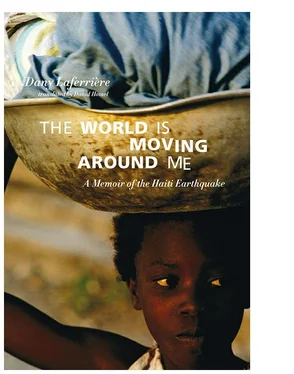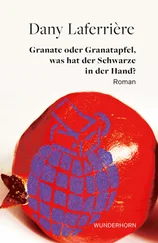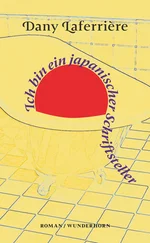Electricity
I was sleeping when I heard a happy shout. What’s happening? Electricity, my sister said. The current’s come back. Suddenly, it’s all hands on deck. She turned on all the lights. She put on coffee. Music played. The energy level rose. The neighbors’ voices were happy too. My sister told me the neighbors were leeching off them. How’s that? She went and rummaged through the drawers, then came back with a bundle of bills and shook them in my face. The figures were unbelievable. For months she’s camped out in the electric company offices, the EDH, trying to get her bills lowered. She managed to speak to someone who understood the problem and who eliminated part of her debt, but on the next bill, the same amount showed up. It’s enough to drive you crazy, she swore. My mother listened to the story from the doorway. These administrative irritations poison their lives. Everything here is designed to spoil your life, my sister declared. My mother said she has nothing left in her veins but poison. But they both agree they can’t live without the little bit of electricity the EDH is willing to supply (four hours a day). Not only because it’s useful, but because my sister refuses “to return to the Middle Ages.” My mother agrees wearily; they’ve been engaged in this struggle forever. My sister, who almost never talks politics, said that the government treats poor people like animals. My mother agreed, but only to support her daughter.
The Presidential Palace
We have started to miss our old lives. Life before January 12, 2010. To be exact, we enjoyed two-thirds of the day of January 12, since the earthquake occurred at 4:53 p.m. Up until 4:52, we lived carefree lives. We had one minute left. What is a minute worth? A lot, since the earthquake didn’t even last a minute. The most shocking news was hearing that the Presidential Palace had collapsed. I remember the silence that followed the news. As if we had lost the war. Months later, we still can’t get used to its absence. The place is the center point around which all dreams of grandeur and all the nation’s hopes collide. Some people on the left are happy that the palace collapsed — for its symbolic value, I suppose. The poorest are the most saddened by its fall. They considered it the only house they could ever own; that idea is more deeply anchored in the ordinary citizen’s mind than you might think. Every mother dreams that one day her first son will sit in the “presidential armchair.” The fact that dictators have squatted there, more often than not over the past two hundred years, doesn’t make that piece of furniture any less desirable. People have never mistaken the building for its occupier. One day they hope to restore its splendor. If a building’s importance resides in the emotion its absence creates, then the palace has a value that’s more than symbolic. A wave of feeling submerged the city, the whole country even, when we learned the palace had fallen with the first tremor. Now the Presidential Palace looks like an enormous white cake set on a low table of grass; it stirs envy and desire like a child’s on his birthday.
January 11
To help her with an article, on the day before the earthquake I went walking through the city with journalist Chantal Guy and photographer Ivanoh Demers. They came by the Hôtel Karibe early to get me. The sky was clear. Finally, the sun was shining. The week before the weather had been lousy, cloudy and cold. This was a piece about Port-au-Prince; they wanted to see the city through my eyes. The journalist was using me to get the editor-in-chief to accept an idea he’d already dismissed out of hand. They protested: “No, we want your view of the city. Your private Port-au-Prince is what we want to share with our readers.” In that case, we’d have to go down to the Champ-de-Mars, the big square in front of the Presidential Palace. We went around the palace. I told them that under Papa Doc, we avoided going past the place. The surveillance was too heavy, and we didn’t want to attract the attention of a tonton-macoute who happened to be in a bad mood. If we had to go by, we did it as quickly as possible and held our breath. Back then, the Champ-de-Mars was our destination. We went there to study and catch a breath of fresh air when it got too hot in our tin-roofed houses, play soccer with our pals, and chase the girls from the nearby neighborhoods who came to study for their exams too. Demers took pictures without bothering to frame the shots. He wanted to catch things on the fly. We headed for the little café (half a dozen tables) next to the Rex Theatre (the best hamburgers in town), and met the cashier I knew when I got a burger on Saturday nights after the western at the Rex. Across the way is the museum of the Collège Saint-Pierre where I first saw the works of Saint-Brice, Hector Hyppolite, Antonio Joseph, Cedor, Lazare, Philippe-Auguste, Wilson Bigaud, Rigaud Benoît, Jasmin Joseph — all the painters I discovered at the beginning of the 1970s. We walked along rue Capois, in front of the Lycée des Jeunes Filles, to rue Lafleur-Duchêne where I lived before I left Haiti for Montreal. I saw the house that I shared with my mother, my sister, and my aunts before they moved, once I’d left, for Carrefour-Feuilles, a humbler neighborhood, and more lively too. A lady invited me into her yard where she’d set up a hair salon underneath an awning. She was hoping to add a new room to her house before the year was out, since the clientele was getting larger by the day. Next to her, a woman getting her hair done made an off-color joke that I didn’t quite catch, though it set off a wave of hilarity. When I left, she was still laughing. We continued down rue Capois to the Hôtel Oloffson where Graham Greene lived at the very beginning of the 1960s when he was writing The Comedians , the novel that, sadly enough, made Papa Doc famous. We sat down at a table and ordered a rum punch and waited for our plates of grilled conch. We all ordered the same thing, hoping that would speed up the service. The food is very good at the Oloffson, but you have to wait forever. We used the time to do a long interview and take a few extra photos. Then we returned to our respective hotels, with a date to meet the following day.
A Word to the Gods
I wonder how long it will be before the event (an earthquake of magnitude seven) is taken up and transformed by voodoo. What do the gods have to say about it? Legba, where are you? Ogou, what do you have to say for yourself? Erzulie, what are your thoughts? Not a word. The gods are silent. If you’re behind this thing, do you have some kind of a plan? What do you have in mind? What do you want? First, show yourselves.
What Does Goudougoudou Want?
Can the popular imagination, which thrives on outsized events, inflate the unthinkable into something even greater? You can count on that. It just needs a little time. I wonder how the religions are going to use the earthquake’s impact on people’s minds. Every religion and denomination encumbering the Haitian landscape is furiously searching for the moment when it first predicted the earthquake. As January 12 turned into January 13, the Jehovah’s Witnesses were already out in the streets of the ruined city, claiming that this was the end of the world as announced by Jehovah himself. Their day of glory had arrived. They’d been right to turn their backs on the world. Jehovah hadn’t lied to them when he warned that God’s wrath could shake the world at any time. He said he would come like a thief in the night and be as swift as lightning. And that’s exactly what happened. The voodoo priests were more careful; they were abstaining from comment, at least for now. They didn’t want to be held responsible for the disaster. The Protestants and Catholics had already pointed the finger at them. In their opinion, the devil was at work here. But if you ask me, the event will soon have its spot in the voodoo pantheon, and then we’ll find out which god manifested his anger. Maybe the uproar is announcing the appearance of a new god. And that god already has a name in popular culture: “Goudougoudou,” the sound the earth made as it trembled. Those who had no more faith in heaven watched the earth buckle beneath their feet. People were afraid of the hurricane’s winds and the flood’s waters, but the earth itself turned out to be a pitiless foe. What does Goudougoudou want?
Читать дальше












